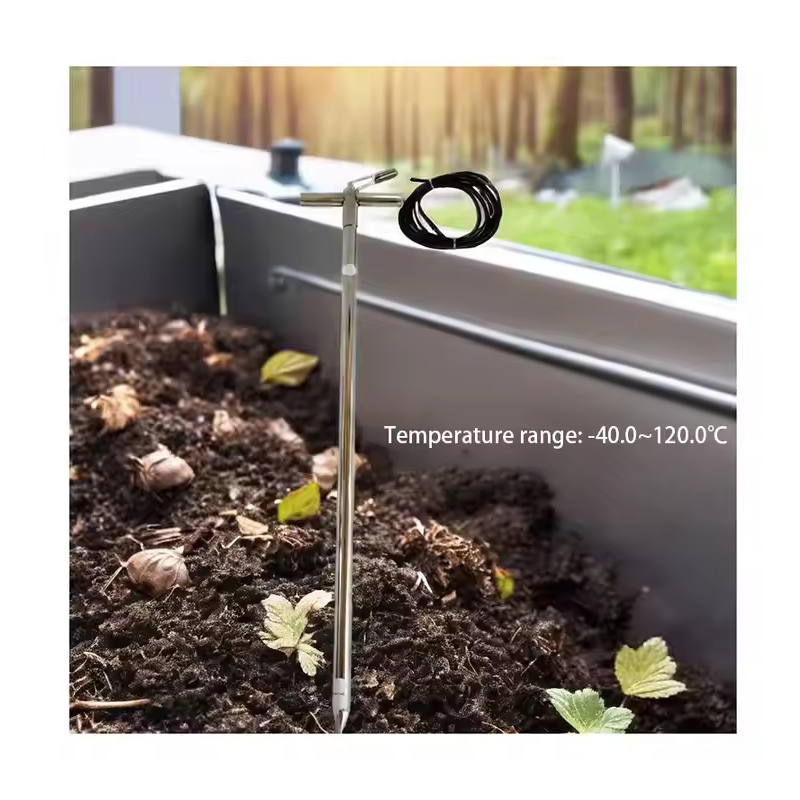In today’s context of resource constraints and increasing environmental awareness, composting has become an important means of organic waste treatment and soil improvement. In order to improve the efficiency and quality of compost, compost temperature sensor came into being. This innovative technology can help farmers and businesses monitor changes in compost temperature in real time to optimize the composting process and protect soil health. This paper will deeply discuss the functions, advantages and application scenarios of compost temperature sensors, and show their important role in modern agriculture and waste management.
1. What is a compost temperature sensor?
Compost temperature sensor is a professional equipment used to monitor the temperature change in the compost process. Temperature is a key factor in the composting process, affecting the activity of microorganisms, the rate of decomposition and the quality of the final compost. By embedding a temperature sensor in the compost pile, users can know the temperature data of the compost in real time, so as to adjust the compost conditions in time, such as turning the pile, adding water or adding raw materials, to ensure the smooth composting process.
2. Main functions of compost temperature sensor
Real-time monitoring
The temperature sensor can monitor the temperature change inside the compost pile in real time, ensuring that the user knows the status of the compost at any time. Through the connection of the sensor, the data can be transmitted to the mobile phone or computer in real time, which is convenient for remote management.
Data recording and analysis
The temperature sensor can record temperature data regularly and generate a detailed temperature graph. The analysis of these data is helpful to understand the fermentation process of compost, optimize the compost formula and improve the quality of compost.
Intelligent alarm system
If the temperature is outside the preset range, the sensor will actively sound an alarm. This function can help users take measures in the first place to prevent compost from overheating or cooling, ensuring the stability of the composting process.
Environmentally friendly
By efficiently managing the composting process, composting temperature sensors can reduce the impact of waste on the environment, reduce gas emissions, improve resource utilization, and promote environmental protection and sustainable development.
3. Advantages of compost temperature sensor
Increase composting efficiency
Accurate temperature monitoring can help users optimize the composting process and increase the rate of decomposition of organic matter, thus speeding up the generation of compost.
Cost saving
Real-time temperature monitoring can reduce unnecessary human input and material waste, and reduce the cost of compost production.
Improve compost quality
By monitoring and adjusting the temperature during the composting process, users can obtain higher quality compost, improve soil health, and increase crop yields.
Wide applicability
The compost temperature sensor is not only suitable for farms, but also helps in gardening, public green space management and urban waste disposal, and is highly adaptable.
4. Practical application cases
Case 1: Compost management on a large farm in Australia
On the farm, farmers have introduced compost temperature sensors to monitor the composting process. The real-time data provided by the sensors allows the farmer to adjust the compost conditions in time, thus reducing the fermentation time of the compost by 30%. This technology not only improves the efficiency of composting, but also significantly improves the quality of fertilizer and helps crops achieve better growth results.
Case 2: Urban horticulture project in Singapore
A horticultural project in a Singapore city uses compost temperature sensors to monitor compost in community gardens. This measure not only improves the quality of compost, but also increases the awareness and participation of community residents in sustainable agriculture, and encourages more people to participate in green environmental protection activities.
5. Future outlook
With the continuous progress of science and technology, the technology of compost temperature sensor will be more mature and its functions will be more abundant. For example, multi-parameter monitoring such as humidity and pH may be added in the future, as well as data analysis through artificial intelligence to provide more scientific recommendations on compost management.
Good soil maintenance is the basis for sustainable agriculture and ecological environment protection. Compost temperature sensor, as a tool to improve the efficiency of compost management, will play an increasingly important role in modern agriculture and urban waste management. Choose compost temperature sensor to contribute to resource optimization and environmental protection together!
For more information,
please contact Honde Technology Co., LTD.
Tel: +86-15210548582
Email: info@hondetech.com
Company website: www.hondetechco.com
Post time: Apr-11-2025


